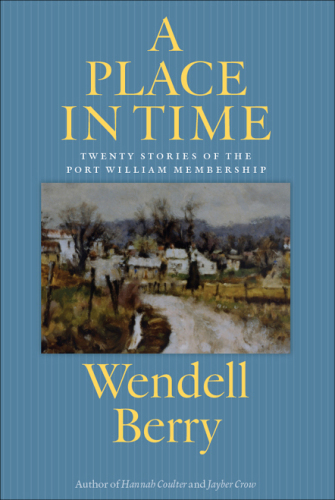
A Place in Time
Twenty Stories of the Port William Membership
کتاب های مرتبط
- اطلاعات
- نقد و بررسی
- دیدگاه کاربران
نقد و بررسی

February 4, 2013
Berry (Hannah Coulter) returns home to Kentucky in his 10th volume in the Port William Membership series with 20 new interconnected stories of the sleepy farming community and its townsfolk. Told from various perspectives and in cadenced reflections, these quiet and meditative "relics and scraps of memory" speak eloquently of familial and romantic love, slavery and war, loss and time's slow but inevitable passing, all with a solemnity and candor often found in Faulkner or Twain. While each offering holds appeal, some are more striking than others. "Fly Away, Breath (1907)" visits Granny Dawe on her deathbed surrounded by kin and, despite the somber mood, a sudden "Hooo!" from the nearly departed lends buoyancy to the story. Reckless wonderment unique to adolescence runs deeply through "Andy Catlett: Early Education (1943)" as 10-year-old Andy gets an illuminating bird's-eye view of his mother while awaiting her corporal punishment after tramping through the house covered in chimney soot. "Stand By Me (1921-1944)" shows Berry's delicate treatment of tragedy as a stalwart father loses first his wife to illness and later his eldest son to the ravages of war. For longtime fans and those new to the series, this rich slice of evolving Americana is just as poignant and enjoyable as ever.

October 1, 2012
The septuagenarian Berry makes a return visit to the genial farm community that much of his fiction has called home. When Berry (Hannah Coulter, 2004, etc.) hasn't been writing poetry or essays on farming life, he's written fiction set in Port William, Ky., which rivals William Faulkner's Yoknapatawpha County in terms of its breadth of imagined historical detail. These 20 new stories feature familiar characters from earlier novels and stories, but the reader needn't have read those to get pleasure out of these. That said, the pleasures of this book are modest: Many of these stories are slight fables, flickering with only the slightest plot then softly ending, consistently well-drawn but not always memorable. One of the most potent stories, for instance, is markedly subtle: "A Desirable Woman" tracks the intersection of a pastor's wife and a young farmhand shortly before the start of World War II, and the story turns on the young man's unrequited crush on the woman shortly before he's sent off to war. "Sold" has a similarly soft-focus, nostalgic cast, narrated by an elderly woman recalling the accumulations that are about to be sold at auction before she enters a nursing home. (The stories are arranged in the order of their chronological setting, from 1864 to 2008, but events largely cling to the WWII and postwar era.) The better, more energetic stories have the comic, homespun feel of tall tales, as in "A New Day," which climaxes in a competition between two horse teams dragging bricks, or "A Burden," about the antics of a drunk relation. Berry is a maker of beautiful sentences, lightly touched with Southern dialect and soberly concerned with the future of the agrarian spirit. But Berry's characters and tone alike feel muted.
COPYRIGHT(2012) Kirkus Reviews, ALL RIGHTS RESERVED.

Starred review from October 1, 2012
Like the rest of Berry's fiction, more than 50 years of it, beginning with the novel Nathan Coulter (1960), these 20 stories are about what one of the most developed of the characters, Burley Coulter, calls the membership of Port William, a farming community in Kentucky not far south of the Ohio River. This is the author's region, too, and decades of his family and their neighboring friends, from the Civil War era to the present, are the models for the people in his fiction. Presented chronologically, these stories span the entire period covered in Berry's work, from 1864 to nowadays. Readers of Berry's other fiction will know some of the narratorshumorous, independent, compassionate Burley Coulter; lifelong but by no means unromantic bachelor Jayber Crow; and quietly magisterial Andy Catlett, the most frequent storyteller and Berry's surrogate. The incidents range from Andy's great-great-grandmother's face-off with a renegade soldier to Burley's eyewitness account of the unwillingly outrageous courtship of Big Ellis to Andy's young son Marcie's reaction to the sudden death of Elton Penn, the finest farmer his father ever knew. The language is warm and cool, as called for; consists mostly of one- and two-syllable words; and constitutes a style as clean and distinctive as Hemingway's, as perspicacious as Mark Twain's.(Reprinted with permission of Booklist, copyright 2012, American Library Association.)

























دیدگاه کاربران